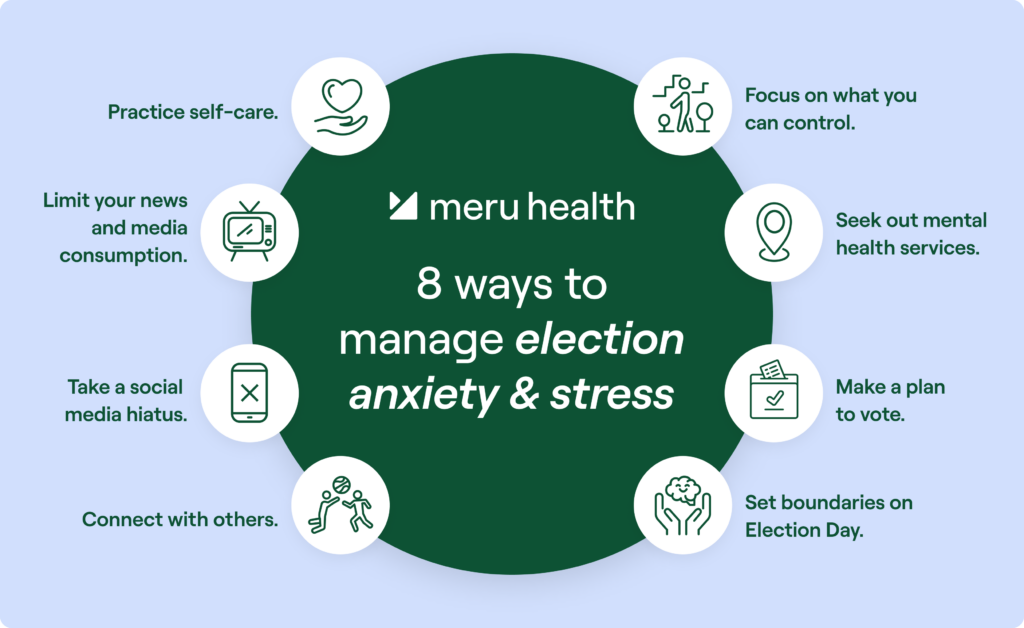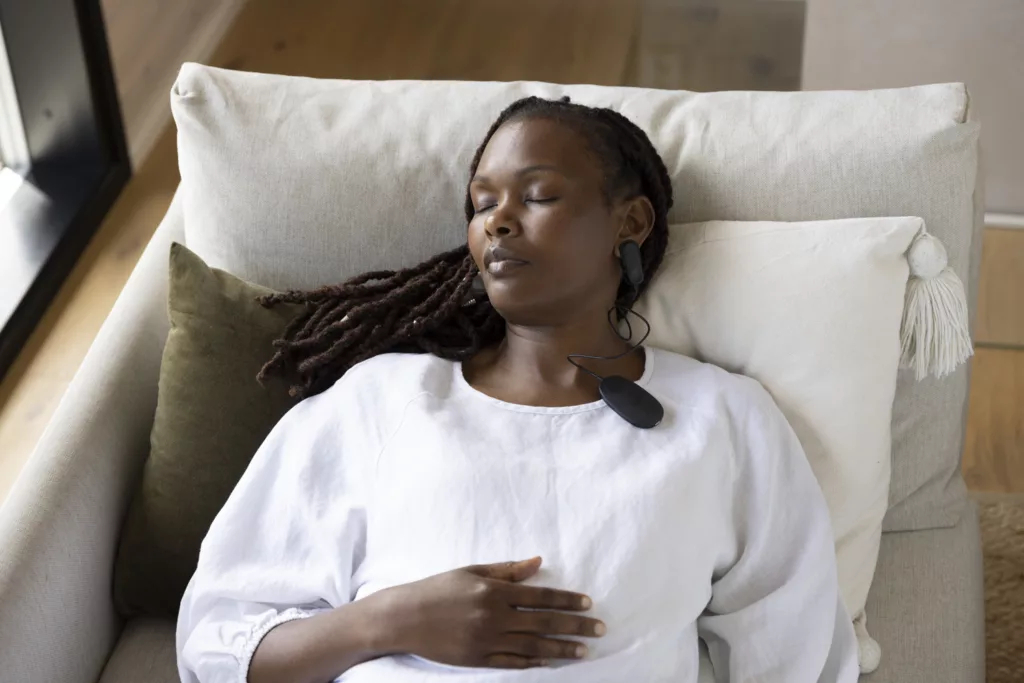July 2024
8 ways to cope with election anxiety and stress

Elections, while joyous occasions, can be a significant source of stress and anxiety—no matter your political party. The constant barrage of political news, social media conflicts, and face-to-face discussions with family members and co-workers can be triggering. Plus, it doesn’t help that we don’t have control over the election’s outcome.
When election anxiety or stress becomes unmanageable, it can lead to unofficial diagnoses that mental health professionals have coined “election stress disorder” and “political anxiety disorder.”
While almost all elections are stressful, the United States’ current political climate and upcoming Presidential Election have Americans feeling more anxious than usual. As of spring 2024, 73% of Americans reported having election anxiety, according to the American Psychiatric Association. These numbers have surely increased since the first presidential debate and Trump’s assassination attempt.
If you’re one of the millions of Americans concerned about the election affecting your mental health, keep reading. You’ll learn how to spot symptoms of election stress, how election stress affects you, and how you can cope this election season.
Identifying symptoms of election stress
Anxiety and stress are already peaking this election season. Some are aware of how the election is affecting them, while others may be anxious or depressed without knowing it.
Election stress symptoms are similar to those of general stress. Here are some common symptoms of election-related stress:
- Feeling more emotional than usual, such as feeling anxious, overwhelmed, nervous, or angry
- Experiencing increased irritability
- Feeling hopeless or powerless about the future
- Trouble with interpersonal relationships, sleep, or work
- Headaches, stomach pains, muscle tension, or chest pain
How election stress affects us
Similar to regular stress, election stress has the power to impact us physically and mentally.
At the psychological level, election stress can lead to mental health issues like anxiety and depression. Both of these mental health challenges can interfere with our overall emotional, physical, and behavioral well-being.
Election stress can also affect us on a physiological level. Stress and anxiety trigger the “fight or flight” response of our autonomic nervous system. This can spike our main stress hormones, epinephrine and cortisol.
High levels of epinephrine can increase the chance of heart attacks and strokes. Excessive cortisol, on the other hand, can cause health issues, such as digestive problems, weight gain, and high blood pressure.
Thankfully, there are ways to cope with and ease the effects of election stress.
8 ways to manage election anxiety and stress
Stress and anxiety are normal reactions to major political events like elections. However, if you find these feelings interfere with your well-being, there are several ways you can manage election stress:
- Limit your news and media consumption. While staying informed is important, constantly checking the news can increase anxiety. Set boundaries for yourself and limit the amount of time you consume political news.
- Practice self-care. Get enough sleep, eat well, exercise, and engage in relaxing activities, such as mindfulness meditation and breathwork, which we’ll explore in more detail momentarily.
- Connect with others. Reach out to family and friends for support. Discussing your feelings with others can help alleviate stress and anxiety. If political conversations arise with your loved ones, which they likely will, don’t be afraid to remove yourself from them.
- Take a social media hiatus. Social media can be a breeding ground for political arguments and negative thoughts. Consider taking breaks from social media or unfollowing (or muting) accounts that contribute to your stress.
- Focus on what you can control. While you can’t control the outcome of an election, you can control how you react. Prioritize your personal well-being and community leading up to and during the election.
- Seek out mental health services. If you find yourself struggling to cope with election-related stress, consider seeking support from a therapist or counselor. Talking to a professional can help you develop coping strategies and provide a safe space to process your emotions.
- Make a plan to vote. To alleviate stress about voting, create a plan. Well ahead of Election Day, inform yourself of voting deadlines, hours, locations, and methods.
- Set boundaries on Election Day. Set boundaries for how much election coverage you’ll watch, your bedtime, and who you will discuss the election results with.

How breathwork can help with election stress and anxiety
While mindfulness meditation can reduce stress, there’s something that’s faster and more effective—guided breath work. A Stanford University study found that participants who did breathing practices had better stress reduction than those who meditated.
Specific breathing techniques are even more effective than others. The most effective method is cyclic sighing. In this technique, you spend more time and consideration on the exhale than the inhale, putting the focus on the release of stress and tension.
Breath work can also increase heart rate variability (HRV), which refers to the variability between heartbeats. Surprisingly, a healthy heart does not have a consistent beat. Instead, it adapts and responds to stressors and relaxation.
A higher HRV indicates an adaptable and resilient system that can effectively switch between responding to stress and recovering. Conversely, a chronically low HRV indicates an elevated state of tension, which is often a precursor to mental and physical health issues. Sleep habits, diet, exercise, caffeine and alcohol, and even posture all affect HRV.
The good news is that HRV can be improved. In addition to adopting breathing exercises, you can increase your HRV with these practical steps:
- Prioritize quality sleep. Aim for at least seven to eight hours of sleep per night.
- Maintain a consistent exercise routine. Try to avoid overtraining or under-train. A balanced exercise routine that includes daily walks is best.
- Stay hydrated. The amount of water you should drink varies per person, but a general rule of thumb is 2 liters of water per day.
- Moderate alcohol and caffeine consumption. Excessive alcohol and caffeine can cause dehydration, which is why you should monitor your intake of both.
- Try out a weighted blanket. Weight blankets promote relaxation and enhance HRV.
- Spend time in nature. A simple walk in the park or hike at a state park can positively impact your HRV.
Now, let’s try out a breathing exercise. Follow the animation below for a few breaths or until you notice an improvement in your mood.
Here at Meru Health, breath work is central to our approach to mental health care.
Meru Health’s previous senior director of data science, Kirstin A., PhD, says: “Through breathwork, we can target the nervous system. Therapy is important for improving mental health problems, but it is only part of the solution. To get the best results, we also have to unwind and rebalance the nervous system.”
Learn more about how we use heart rate variability in our digital mental health program.
Need support? Mental health care is here
As we enter another stressful election season, one thing is clear: poor mental health and politics go hand-in-hand. However, with simple tools and practices, you can navigate this and every election with resilience, strength, and ease.
If you are searching for additional support during this Presidential Election, we’re here to help.
Our dedicated, licensed therapists provide personalized care and strategies that can help you tackle election stress and anxiety. You can contact your therapist anytime, anywhere, through the secure in-app chat or schedule video sessions. You’ll receive additional care through the Meru Health platform, where daily practices help you reduce stress and improve your well-being with interactive lessons on mindfulness, cognitive behavioral therapy, and even sleep and nutrition.
Learn more about Meru Health or get started with a free health assessment.
If you need immediate assistance, please call SAMHSA’s National Helpline at 1-800-662-HELP (4357). It’s a free, confidential, 24/7 treatment referral and information service for mental illness or substance abuse.





